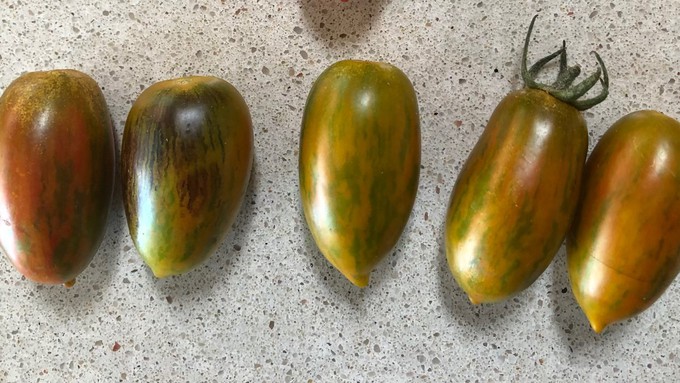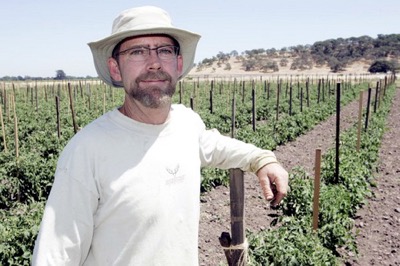
Tomato breeder extraordinaire will share insights, latest varieties

These five tomatoes show the wild color variation in Brad's Atomic Grape tomato, developed by Brad Gates of Wild Boar Farms. Kathy Morrison
Meet the man who made the world of tomatoes a much more colorful – and flavorful – planet.
Brad Gates, owner of Wild Boar Farms Exotic Tomatoes, will talk all things tomato during a special appearance at 10 a.m. Saturday, Feb. 25, at Green Acres Nursery & Supply’s Sacramento store. Admission and parking are free.
With such eye-catching varieties as Pink Berkeley Tie-Dye and Brad’s Atomic Grape, Wild Boar has rocked the tomato world with disease-resistant, rainbow-hued varieties that taste like heirlooms but are far easier to grow. Gates is universally recognized for introducing black- or purple-skinned tomatoes as well as his distinctive striped varieties.
For his Saturday talk, Gates will chat about his new introductions as well as share his insights to tomato success.
“Brad will share his expertise on the latest varieties he is producing for this spring, as well as provide tips and tricks for growing tomatoes in our region,” says Green Acres. “He will delve into various growing styles and trellising techniques, and will conclude the event with a Q&A session. ... Whether you're an avid gardener or just curious about growing your own tomatoes, this is an event you won't want to miss!”
Gates, who grows his tomatoes in Solano County, has become the go-to guru for NorCal tomato lovers. He creates his new varieties the old-fashioned way: Breeding two varieties together and watching what happens.

“Our focus is in breeding stunning-looking tomato varieties with extreme flavor,” Gates explains on his website. “All of our tomatoes are grown using all-organic growing techniques and are absolutely NOT GMO. We are true believers in using organic and sustainable practices.
“Our tomato varieties are the result of many years of hard work growing ten of thousands of plants, being very picky about seed selection and capitalizing on some amazing gifts from Mother Nature,” he adds. “Tomatoes have changed more in the last 10 years than they have in their entire existence. The bar is being raised and tomato lovers can now reap the rewards. I consider these tomato varieties the Heirlooms of the Future.”
For more on Wild Boar and its tomatoes, visit www.wildboarfarms.com.
Green Acres is located at 8501 Jackson Road, Sacramento.
Details and directions: www.idiggreenacres.com.
Comments
0 comments have been posted.Sacramento Digs Gardening to your inbox.
Food in My Back Yard Series
May 6: Maintain soil moisture with mulch for garden success
April 29: What's (already) wrong with my tomato plants?
April 22: Should you stock up on fertilizer? (Yes!)
April 15: Grow culinary herbs in containers
April 8: When to plant summer vegetables
April 1: Don't be fooled by these garden myths
March 25: Fertilizer tips: How to 'feed' your vegetables for healthy growth
March 18: Time to give vegetable seedlings some more space
March 11: Ways to win the fight against weeds
March 4: Potatoes from the garden
Feb. 25: Plant a fruit tree now -- for later
Feb. 18: How to squeeze more food into less space
Feb. 11: When to plant? Consider staggering your transplants
Feb. 4: Starting in seed starting
Sites We Like
Garden Checklist for week of May 11
Make the most of the lower temperatures early in the week. We’ll be back in the 80s by Thursday.
* Plant, plant, plant! It’s prime planting season in the Sacramento area. Time to set out those tomato transplants along with peppers and eggplants. Pinch off any flowers on new transplants to make them concentrate on establishing roots instead of setting premature fruit.
* Direct-seed melons, cucumbers, summer squash, corn, radishes, pumpkins and annual herbs such as basil.
* Harvest cabbage, lettuce, peas and green onions.
* In the flower garden, direct-seed sunflowers, cosmos, salvia, zinnias, marigolds, celosia and asters. (You also can transplant seedlings for many of the same flowers.)
* Plant dahlia tubers.
* Transplant petunias, marigolds and perennial flowers such as astilbe, columbine, coneflowers, coreopsis, dahlias, rudbeckia and verbena.
* Keep an eye out for slugs, snails, earwigs and aphids that want to dine on tender new growth.
* Feed summer bloomers with a balanced fertilizer.
* For continued bloom, cut off spent flowers on roses as well as other flowering plants.
* Add mulch to the garden to maintain moisture. Mulch also cuts down on weeds. But don’t let it mound around the stems or trunks of trees or shrubs. Leave about a 6-inch-to-1-foot circle to avoid crown rot or other problems.
* Remember to weed! Pull those nasties before they set seed.
* Water early in the day and keep seedlings evenly moist.